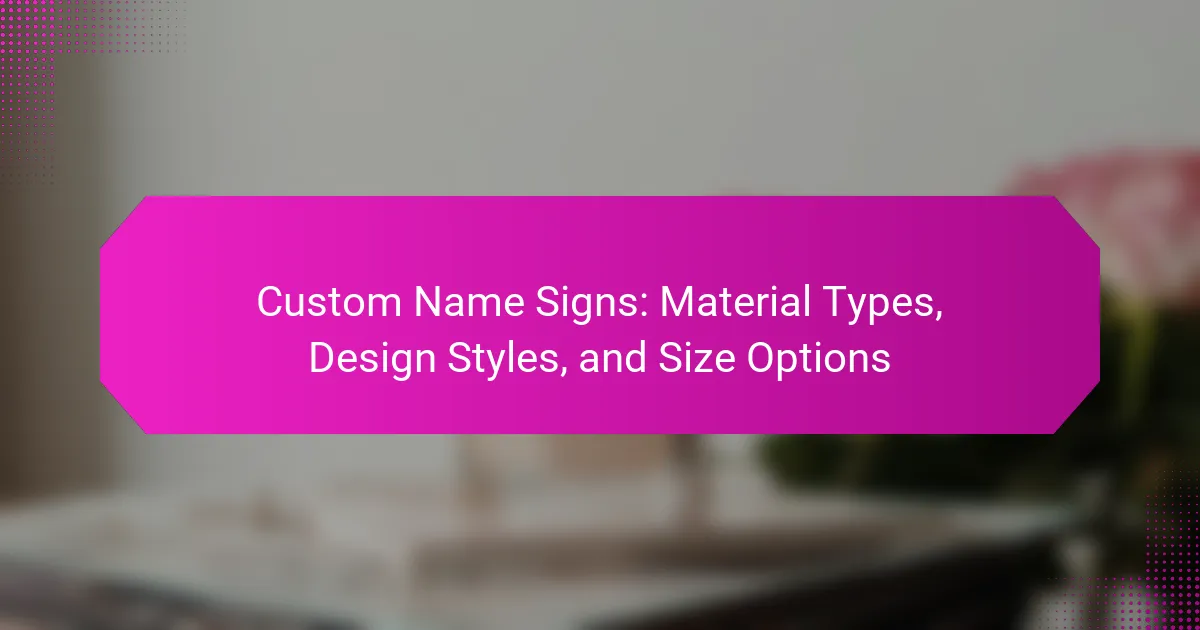Custom name signs are personalized displays featuring an individual’s name, commonly used for decoration, identification, or gifting. These signs can be crafted from various materials, including wood, metal, acrylic, and plastic, each offering different aesthetic and functional properties. Design styles range from modern and rustic to classic and whimsical, allowing for extensive customization based on individual preferences. Size options vary, with common dimensions including 12×6 inches, 18×12 inches, and 24×18 inches, as well as custom sizes to meet specific needs. This article provides an overview of the materials, design styles, and size options available for custom name signs, highlighting their versatility in both home and business settings.
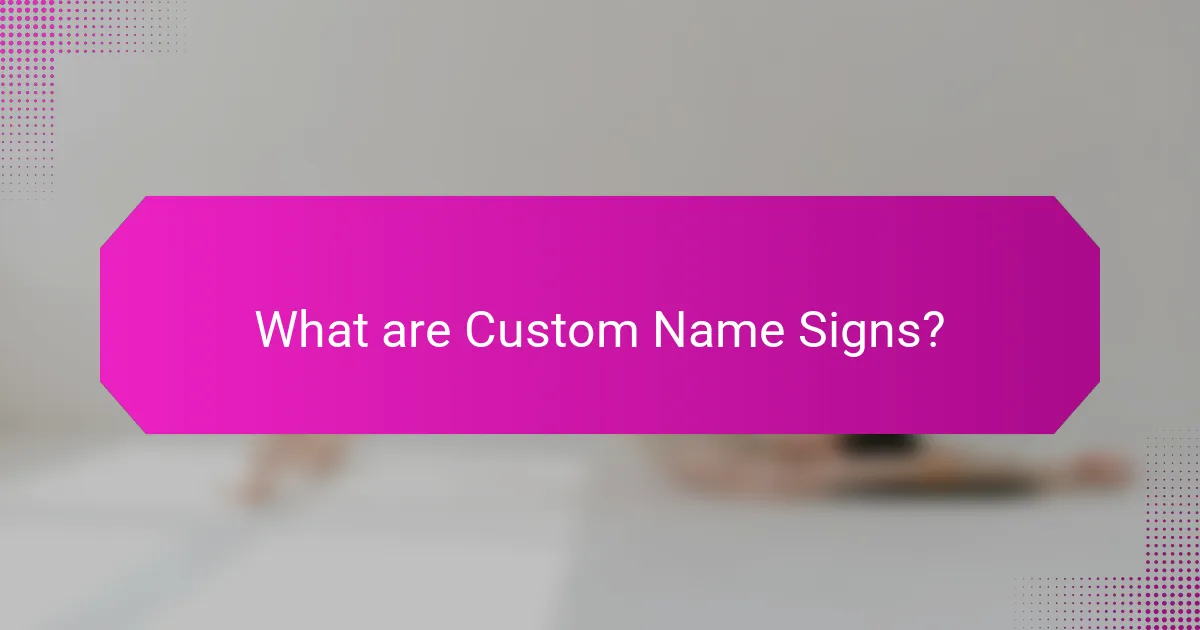
What are Custom Name Signs?
Custom name signs are personalized displays that feature an individual’s name. They are often used for decoration, identification, or gifting purposes. Materials for these signs can include wood, metal, acrylic, and more. Design styles vary widely, from modern to rustic, allowing for customization based on personal preferences. Size options can range from small plaques to large wall hangings. Custom name signs serve both functional and aesthetic roles in homes and businesses.
How are Custom Name Signs used in different settings?
Custom name signs are utilized in various settings for identification and personalization. In residential settings, they display family names or house numbers. This enhances curb appeal and provides clear identification for visitors. In commercial spaces, custom name signs identify businesses and enhance branding. They can include logos and taglines to attract customers. Educational institutions use them for classrooms and offices, helping to identify staff and departments. Hospitals and clinics employ custom name signs for patient rooms and staff identification, improving navigation and care. Event venues use them for personalized seating arrangements or directional signage. Each setting benefits from the clarity and personalization that custom name signs provide.
What are the common applications of Custom Name Signs in homes?
Custom name signs in homes are commonly used for personalization and identification. They often serve as house numbers or address markers. These signs help visitors locate a residence easily. Custom name signs can also identify family names on doors or entryways. They are frequently used in home offices to designate workspaces. Additionally, these signs may be used in children’s rooms for personalization. They can also enhance outdoor spaces, such as gardens or patios, by adding a personal touch. Custom name signs contribute to the overall aesthetic and welcoming atmosphere of a home.
How do businesses utilize Custom Name Signs for branding?
Businesses utilize Custom Name Signs to enhance brand visibility and identity. These signs display the company’s name prominently at locations. They serve as a first point of contact for potential customers. Custom Name Signs can be designed to reflect the brand’s unique style and values. This personalization fosters a connection with the audience. High-quality materials are often used to ensure durability and aesthetic appeal. Effective signage can increase foot traffic by up to 20%, according to studies. Overall, Custom Name Signs are a strategic investment in branding efforts.
What are the key benefits of Custom Name Signs?
Custom name signs offer personalized identification and aesthetic appeal. They enhance visibility for homes and businesses. Customization allows for unique designs that reflect individual style. High-quality materials ensure durability and longevity. They can be tailored to fit any space or theme. Custom name signs also serve as effective branding tools. They create a welcoming atmosphere for guests and clients. Overall, these signs combine functionality with personal expression.
How do Custom Name Signs enhance personal expression?
Custom name signs enhance personal expression by allowing individuals to showcase their unique identity. These signs can be tailored in various styles, colors, and materials to reflect personal taste. Customization options enable people to incorporate their favorite fonts, symbols, or images. This personalization makes the signs a true representation of the owner’s personality. Research indicates that personalized items can increase feelings of ownership and attachment. A study published in the Journal of Consumer Research highlights that customized products foster a stronger emotional connection. Thus, custom name signs serve as a powerful medium for self-expression.
What role do Custom Name Signs play in improving visibility?
Custom Name Signs significantly enhance visibility for businesses and properties. They serve as clear identifiers that can be seen from a distance. Effective design elements, such as color contrast and font size, contribute to this visibility. High-quality materials can withstand environmental factors, maintaining legibility over time. Research indicates that well-placed signs can increase foot traffic by up to 50%. This visibility is crucial for attracting customers and establishing brand presence. Customization allows for unique designs that reflect the entity’s identity, further enhancing recognition. Overall, Custom Name Signs play a vital role in ensuring entities are easily identifiable and accessible.
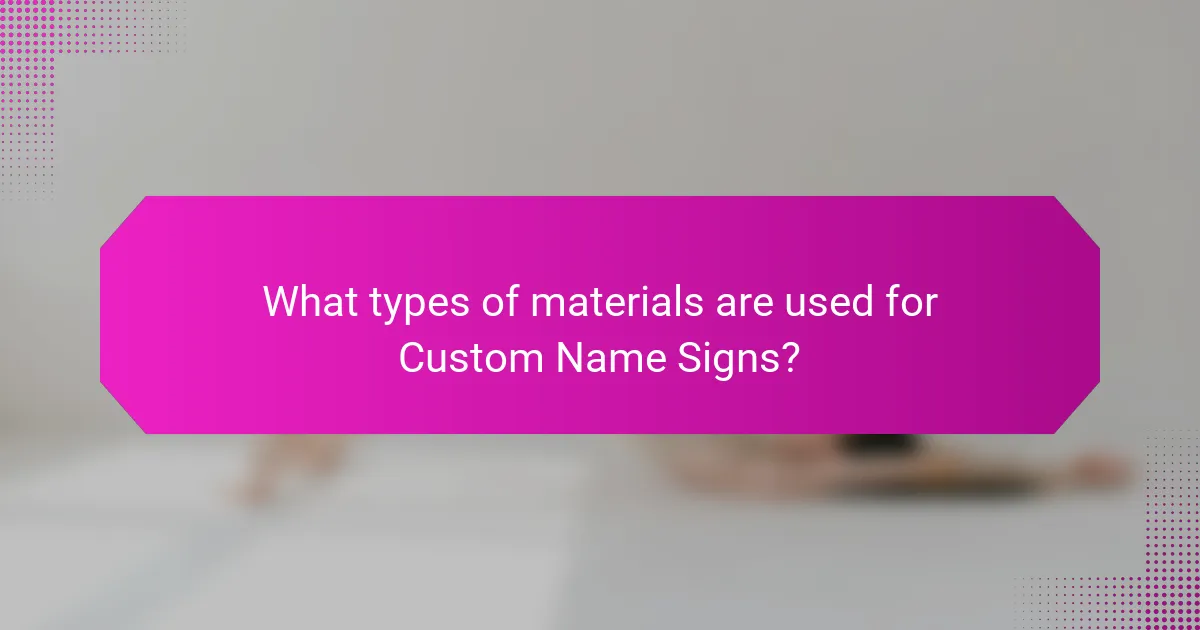
What types of materials are used for Custom Name Signs?
Custom name signs can be made from various materials. Common materials include wood, metal, acrylic, and plastic. Wood offers a natural look and can be easily customized. Metal provides durability and a sleek appearance. Acrylic is lightweight and available in many colors. Plastic is often used for its affordability and versatility. Each material has unique properties that cater to different design preferences and settings.
What are the most popular materials for Custom Name Signs?
The most popular materials for custom name signs include wood, metal, acrylic, and foam. Wood offers a classic, rustic look and is easily customizable. Metal provides durability and a modern aesthetic, often used for outdoor signs. Acrylic is lightweight and versatile, allowing for vibrant colors and intricate designs. Foam is cost-effective and suitable for temporary displays or indoor use. Each material has unique attributes that cater to different design preferences and functional needs.
How does wood compare to metal for Custom Name Signs?
Wood is generally more cost-effective and offers a warm aesthetic for custom name signs compared to metal. Wood can be easily carved and painted, allowing for intricate designs and personalization. It is lightweight, making installation simpler. However, wood is susceptible to weather damage and requires maintenance. Metal, on the other hand, is more durable and resistant to the elements. It offers a sleek, modern look and can be finished in various ways. Metal signs are heavier and may require more robust mounting solutions. Overall, the choice between wood and metal depends on the desired aesthetic and functional requirements for the custom name sign.
What are the advantages of using acrylic for Custom Name Signs?
Acrylic offers several advantages for custom name signs. It is lightweight, making installation easy and convenient. Acrylic is also durable and resistant to weather conditions, which extends the sign’s lifespan. The material can be easily cut and shaped into various designs, allowing for customization. Acrylic provides a smooth surface that enhances the vibrancy of colors and graphics. Additionally, it is available in various thicknesses and finishes, offering versatility in design. Acrylic is less prone to shattering compared to glass, ensuring safety in various environments. These characteristics make acrylic a popular choice for custom name signs.
What factors influence the choice of material for Custom Name Signs?
The choice of material for Custom Name Signs is influenced by durability, aesthetics, cost, and intended use. Durability ensures that the sign withstands environmental conditions. Materials like metal and acrylic offer longevity. Aesthetics play a role in matching the sign to the desired style or theme. Cost affects the budget available for the sign. Different materials have varying price points. Intended use determines whether a sign needs to be weather-resistant or suitable for indoor display. For example, wood may be ideal for interior signs, while metal suits outdoor applications.
How does the intended location affect material selection?
The intended location significantly affects material selection for custom name signs. Environmental factors dictate the durability and longevity of materials. For outdoor locations, weather-resistant materials like acrylic or metal are preferred. These materials withstand UV exposure, moisture, and temperature fluctuations. Indoor signs may utilize wood or foam board, which are more suitable for controlled environments. Additionally, aesthetic considerations based on location influence material choice. For example, a rustic setting may favor wooden signs, while a modern office may opt for sleek metal or glass. Local regulations may also impact material selection, as certain areas have guidelines for signage materials.
What budget considerations should be taken into account for materials?
Budget considerations for materials include the cost of raw materials, shipping expenses, and potential waste. The type of material chosen significantly impacts the overall budget. For example, high-quality materials like metal or wood are often more expensive than plastic. Labor costs for installation or customization should also be factored in. Additionally, bulk purchasing may lead to discounts, affecting the final budget. Finally, consider the longevity and maintenance costs of materials, as these can influence long-term expenses.
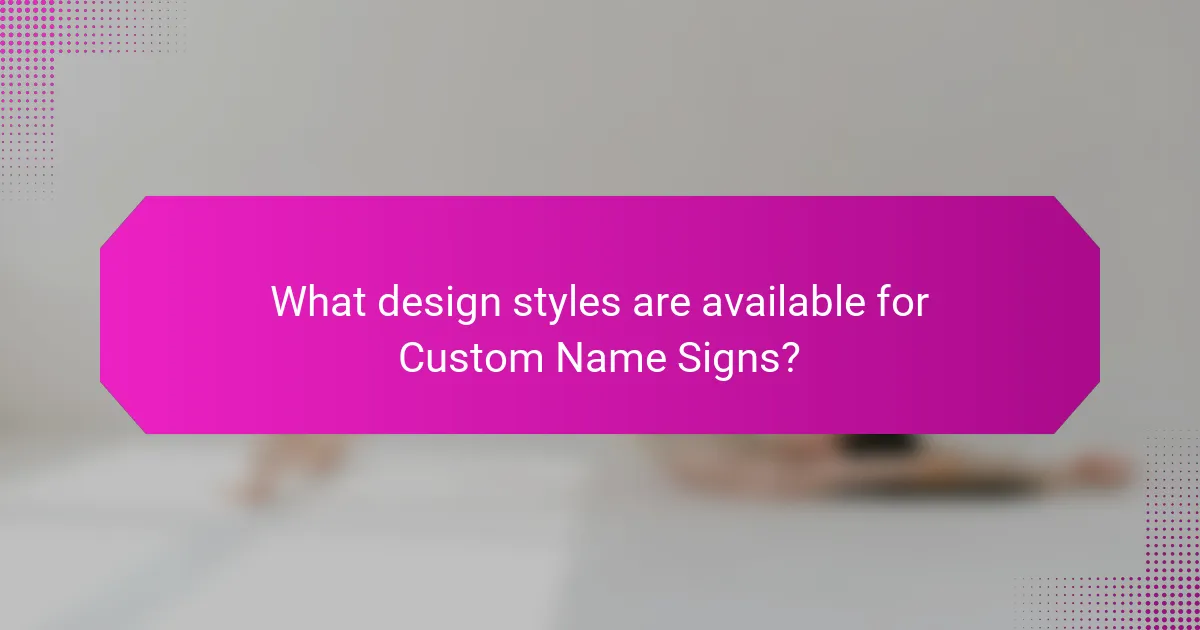
What design styles are available for Custom Name Signs?
Custom name signs are available in various design styles. Popular styles include modern, rustic, classic, and whimsical. Modern designs often feature sleek lines and minimalistic elements. Rustic styles typically incorporate natural materials and distressed finishes. Classic designs emphasize traditional fonts and elegant embellishments. Whimsical styles use playful colors and unique shapes. Each style caters to different aesthetic preferences and settings. Customization options allow for personalization within these styles, enhancing their appeal.
What are the common design styles for Custom Name Signs?
Common design styles for Custom Name Signs include modern, rustic, vintage, and minimalist. Modern designs often feature clean lines and bold typography. Rustic styles utilize natural materials and earthy colors. Vintage designs may incorporate ornate fonts and distressed finishes. Minimalist styles focus on simplicity and functionality, using fewer elements. Each style caters to different aesthetic preferences and settings.
How do modern designs differ from traditional styles?
Modern designs prioritize minimalism and functionality, while traditional styles emphasize ornamentation and historical references. Modern designs often utilize clean lines and open spaces, contrasting with the intricate details found in traditional styles. Additionally, modern designs frequently incorporate innovative materials like acrylic and metal, whereas traditional styles typically use wood and stone. The color palettes in modern designs tend to be neutral and monochromatic, while traditional styles often feature rich, vibrant hues. Modern designs also embrace technology, integrating features like LED lighting, which is rarely found in traditional styles. These differences reflect broader cultural shifts towards simplicity and efficiency in contemporary design practices.
What are the characteristics of minimalist Custom Name Signs?
Minimalist Custom Name Signs are characterized by simplicity and clean lines. They often use a limited color palette, typically monochromatic or neutral tones. The design focuses on functionality, avoiding unnecessary embellishments. Materials commonly used include wood, metal, or acrylic, emphasizing durability and elegance. The typography is usually sans-serif, promoting readability and modern aesthetics. These signs are often custom-made to reflect personal style while maintaining a sleek appearance. Overall, they embody a balance between form and function, appealing to contemporary design preferences.
How can design styles affect the perception of Custom Name Signs?
Design styles significantly influence the perception of Custom Name Signs. A modern design style often conveys sophistication and contemporary appeal. Conversely, a vintage design style can evoke nostalgia and warmth. Bold typography in design can enhance readability and draw attention. Subtle color palettes may create a calming effect, while vibrant colors can energize and attract interest. Research shows that visual aesthetics impact consumer emotions and decisions. According to a study by the Journal of Consumer Research, design elements can alter brand perception. This demonstrates that the choice of design style directly affects how viewers interpret and value Custom Name Signs.
What impact does color choice have on design style?
Color choice significantly influences design style. It affects emotions, perceptions, and overall aesthetics. For instance, warm colors like red and orange evoke energy and excitement. Conversely, cool colors such as blue and green promote calmness and tranquility. Research shows that color can impact consumer behavior. According to a study by the Institute for Color Research, people make a subconscious judgment about a person, environment, or product within 90 seconds, and between 62-90% of that assessment is based on color alone. Therefore, selecting appropriate colors is crucial for effective design in custom name signs.
How do fonts and typography contribute to overall design?
Fonts and typography significantly impact overall design by influencing readability and aesthetic appeal. They establish the visual hierarchy, guiding viewers through the content. The choice of font can evoke specific emotions and brand identity. For example, serif fonts often convey tradition and reliability, while sans-serif fonts suggest modernity and simplicity. Research shows that 95% of users consider typography vital for first impressions. Additionally, typography affects user engagement; clear and attractive text can enhance user interaction with the design. Proper typography ensures that messages are communicated effectively, reinforcing the design’s purpose.
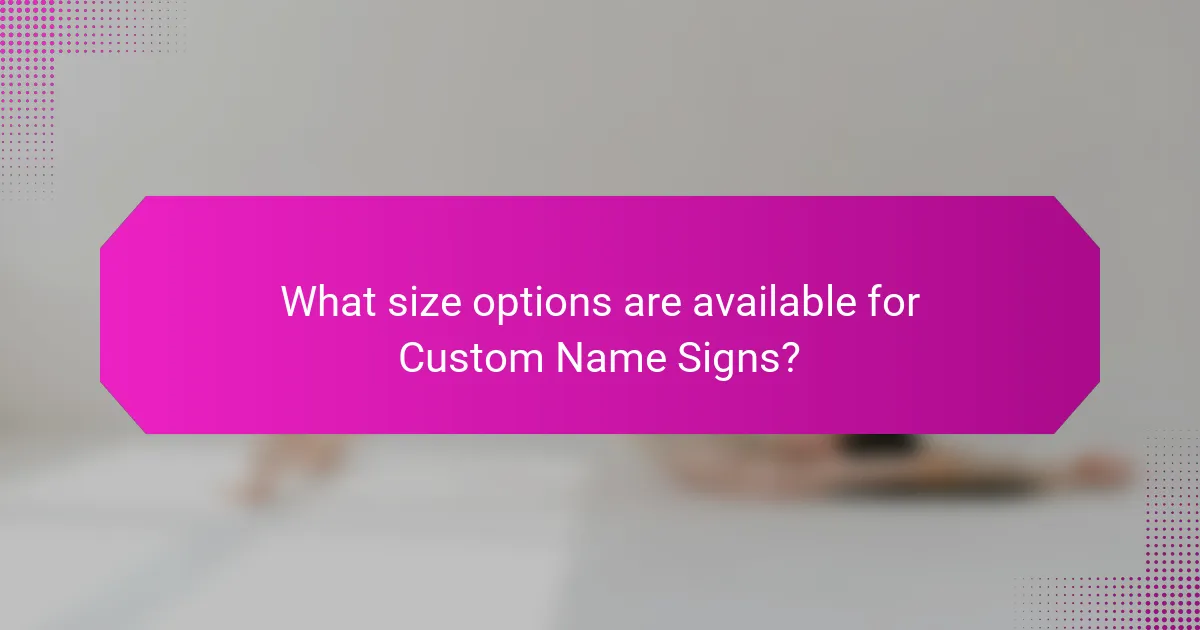
What size options are available for Custom Name Signs?
Custom name signs are available in various size options. Common sizes include 12×6 inches, 18×12 inches, and 24×18 inches. Some manufacturers also offer custom dimensions to fit specific requirements. The choice of size often depends on the intended use and visibility needs. Larger signs are typically used for outdoor display, while smaller sizes may be suitable for indoor use. Customization allows for flexibility in dimensions, accommodating different design preferences.
How do you determine the appropriate size for Custom Name Signs?
To determine the appropriate size for Custom Name Signs, consider the location and visibility requirements. Measure the space where the sign will be placed. Ensure the sign is large enough to be read from a distance. Standard sizes often range from 12 to 24 inches in height. The font style also affects readability; thicker fonts may require larger sizes. Additionally, local regulations may dictate minimum sizes for signage. For example, commercial properties may have specific guidelines for visibility.
What factors should be considered when choosing the size?
When choosing the size of custom name signs, several factors must be considered. The visibility of the sign is crucial; larger signs are more visible from a distance. The intended location also matters; signs placed high or far away may require larger dimensions. The amount of text affects size; more text typically necessitates a larger sign for readability.
Aesthetic considerations are important; the sign should complement the surrounding environment. Local regulations may dictate size limits for signage; compliance is essential to avoid fines. The target audience influences size; signs for businesses may need to be larger to attract attention.
Finally, budget constraints can impact size; larger signs often incur higher production and installation costs. Each of these factors plays a significant role in determining the appropriate size for custom name signs.
How does placement influence the size of Custom Name Signs?
Placement significantly influences the size of Custom Name Signs. The location determines visibility and legibility. For instance, signs placed at eye level may require larger fonts for better readability. Conversely, signs positioned high on walls may need to be larger to be seen from a distance. Additionally, placement in outdoor areas may require larger signs to counteract environmental factors like distance and lighting. Research indicates that signs with appropriate sizing based on their placement enhance user engagement and recognition. Therefore, understanding the intended placement is crucial for determining the optimal size of Custom Name Signs.
What are the standard size options for Custom Name Signs?
Standard size options for Custom Name Signs typically include 12×6 inches, 18×12 inches, and 24×18 inches. These sizes cater to various needs and preferences. Many manufacturers offer these dimensions to ensure visibility and aesthetic appeal. Custom sizes are also available but may vary by provider. The standard sizes are commonly used for residential and commercial purposes. They provide a balance between readability and design flexibility. Custom Name Signs can be made in various materials, which can also influence size choices.
What are the benefits of larger Custom Name Signs?
Larger Custom Name Signs offer enhanced visibility and recognition. They can be seen from greater distances, making them effective for attracting attention. A larger size allows for more intricate designs and details, which can enhance aesthetic appeal. Additionally, they provide ample space for personalization, allowing for unique branding opportunities. Research indicates that signs with larger dimensions can increase customer foot traffic by up to 50%. This demonstrates their effectiveness in marketing and communication. Larger signs also improve readability, which is crucial for conveying information quickly and clearly. Overall, the benefits of larger Custom Name Signs include improved visibility, design complexity, personalization, and increased customer engagement.
How do smaller Custom Name Signs fit into different environments?
Smaller Custom Name Signs fit into different environments by offering versatility and adaptability. They can be used in residential spaces, such as entryways or home offices, providing a personal touch. In commercial settings, these signs enhance branding by displaying business names clearly. Outdoor environments benefit from durable materials, ensuring visibility and weather resistance. Smaller signs can also be integrated into various decor styles, from modern to rustic. Their compact size allows placement in limited spaces without overwhelming the area. Research indicates that personalized signage increases customer engagement, making them effective in retail environments.
What tips should you consider when ordering Custom Name Signs?
When ordering Custom Name Signs, consider the material, design, and size. Select a durable material suitable for your environment, such as wood, metal, or acrylic. Choose a design that reflects your style and is easy to read. Ensure the size is appropriate for the intended display area. Review font styles and colors for visibility. Confirm the customization options available from the provider. Check for any additional features, like lighting or mounting hardware. Finally, read customer reviews to gauge quality and satisfaction.
Custom name signs are personalized displays featuring an individual’s name, used for decoration, identification, or gifting. This article covers the various materials used for custom name signs, including wood, metal, acrylic, and plastic, along with their unique attributes and advantages. It also explores design styles such as modern, rustic, and minimalist, and discusses size options ranging from small plaques to large wall hangings. Additionally, the article highlights the practical applications of custom name signs in residential, commercial, and educational settings, emphasizing their role in enhancing visibility and personal expression.
